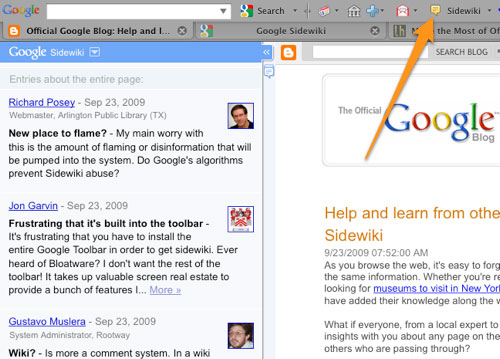On September 23rd, 2009 Google released an update to Google toolbar, which can be installed as a plug-in for you browser. Part of that update was a new feature called Sidewiki, which allows users to post comments and feedback on a small tab that is attached to individual websites. It displays as a small arrow tab on the left side of the browser and once clicked expands to reveal comments left by other users of the Google Toolbar and presents the user with a form field to enter comments of their own. Moreover, the site owner has little to no control over the comments that are posted on the Sidewiki. Google will use special ranking algorithms to sort out comment relevancy. One criteria that will be considered is what other users think as they have the ability to vote comments up or down.

What does all this mean to website authors? It?s another step in the progressive openness of the web. Brands and content providers have less and less control over what people say about them online. Imagine if Wal-Mart had a large white board affixed to the front of every store where customers could write whatever they want. Or think about a LED ticker outside the GM offices that anyone could update. Companies now have even less control over public perception. In the past a brand could sometimes get away with poor service or shoddy products as long as they had a firm command of the spin. Those days are officially over. Corporate America, consider yourself on notice. If you cannot provide adequate goods and services you will not survive.

In his book What Would Google Do, author Jeff Jarvis provides a brief case study that demonstrates how life for brands work in a post-Google world. Companies must no longer sit on the sidelines but instead be active participants in the conversation. His example focused on the impact of blogging on customer service at Dell. Since that time Twitter and the social media revolution has made this information even easier to spread and search. Sidewiki is the next logical step. Now, users don?t even need to leave the brand?s website to find out what consumers think, just pop open the Sidewiki and read away. Fortunately, Google has allowed for web site owners to ?claim? their site on Sidewiki. This feature allows the site?s owner to place a comment that will appear above all other comments. Detailed instructions on how to claim your website can be found here.
It is essential that brands pay attention to this new space. Joining the conversation and reacting quickly to negative feedback is imperative. It remains to be seen if Google will support this new technology. Often times Google will release products such as Sidewiki and then grow tired of them like a child playing with last year?s toys. However, if the public responds favorably this could very well be the most important conversation you have about your brand online. While it might not have the sex appeal of Twitter, this is permanent graffiti attached to your home page. Ignore it at your own peril.

